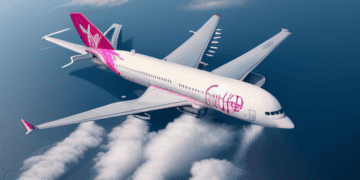Virgin Atlantic has achieved a significant milestone in aviation history by operating the first commercial long-haul flight entirely powered by sustainable aviation fuel (SAF). The flight, which took off from London and was destined for New York, departed on Tuesday, marking a crucial step in the aviation industry’s efforts to reduce carbon emissions.
Details of the Flight
The flight, designated as Flight100 by Virgin Atlantic, was conducted using a Boeing 787 equipped with Rolls-Royce Trent 1000 engines. Notably, this flight did not carry any paying passengers or cargo. Among those on board were Virgin Atlantic’s founder Richard Branson, the airline’s CEO Shai Weiss, and Britain’s Transport Minister Mark Harper.
The aircraft took off at 11:49 GMT and was scheduled to arrive at New York’s John F Kennedy International Airport at around 19:50 GMT. This follows the successful transatlantic crossing by a Gulfstream G600 business jet, which also used 100 percent SAF last week.
The Role and Composition of SAF
Sustainable aviation fuel is emerging as a critical solution for reducing aviation emissions. Currently, SAF is blended with traditional kerosene in jet engines, but the success of Virgin Atlantic’s flight demonstrates the feasibility of using SAF exclusively. The fuel for this flight was primarily composed of used cooking oil and waste animal fat, with a minor portion of synthetic aromatic kerosene derived from waste corn.
Aviation Industry’s Move Towards Decarbonization
As the world focuses on decarbonizing various industries, airlines are increasingly looking towards SAF as a means to significantly reduce their carbon footprint. The use of SAF is expected to cut emissions by up to 70 percent, making it a vital transition fuel until electric and hydrogen-powered aircraft become viable in the future.
Challenges and Goals Ahead
Despite the promise of SAF, its adoption faces challenges, primarily due to its cost and current limited production. SAF is significantly more expensive than conventional jet fuel, costing about three to five times more. Additionally, it currently makes up less than 0.1 percent of total global jet fuel usage.
The aviation industry, including major European airlines like Virgin-owned British Airways and Air France, aims to increase SAF usage to 10 percent by 2030. Achieving the industry’s goal of “net zero” emissions by 2050 hinges on raising this share to 65 percent. However, the 2030 target presents a substantial challenge given the current production volumes and cost of SAF.
Global Significance
This landmark flight precedes the COP28 climate talks in Dubai, highlighting the urgency and innovation in tackling climate change within the aviation sector. The successful operation of a commercial flight on 100 percent SAF marks a pivotal moment in the journey towards more sustainable air travel.
Stay current with supply chain report news at The Supply Chain Report. For international trade tools, see ADAMftd.com.
#VirginAtlantic #SustainableAviationFuel #SAF #AviationDecarbonization #GreenAviation #CleanEnergyFlight #FutureOfFlight #SAF100 #EcoFriendlyTravel #SustainableAirTravel #AviationInnovation #NetZeroAviation #ClimateAction #AviationHistory #SustainableFuture #RollsRoyceEngines #RichardBranson #ShaiWeiss #Flight100 #AviationSustainability #COP28















